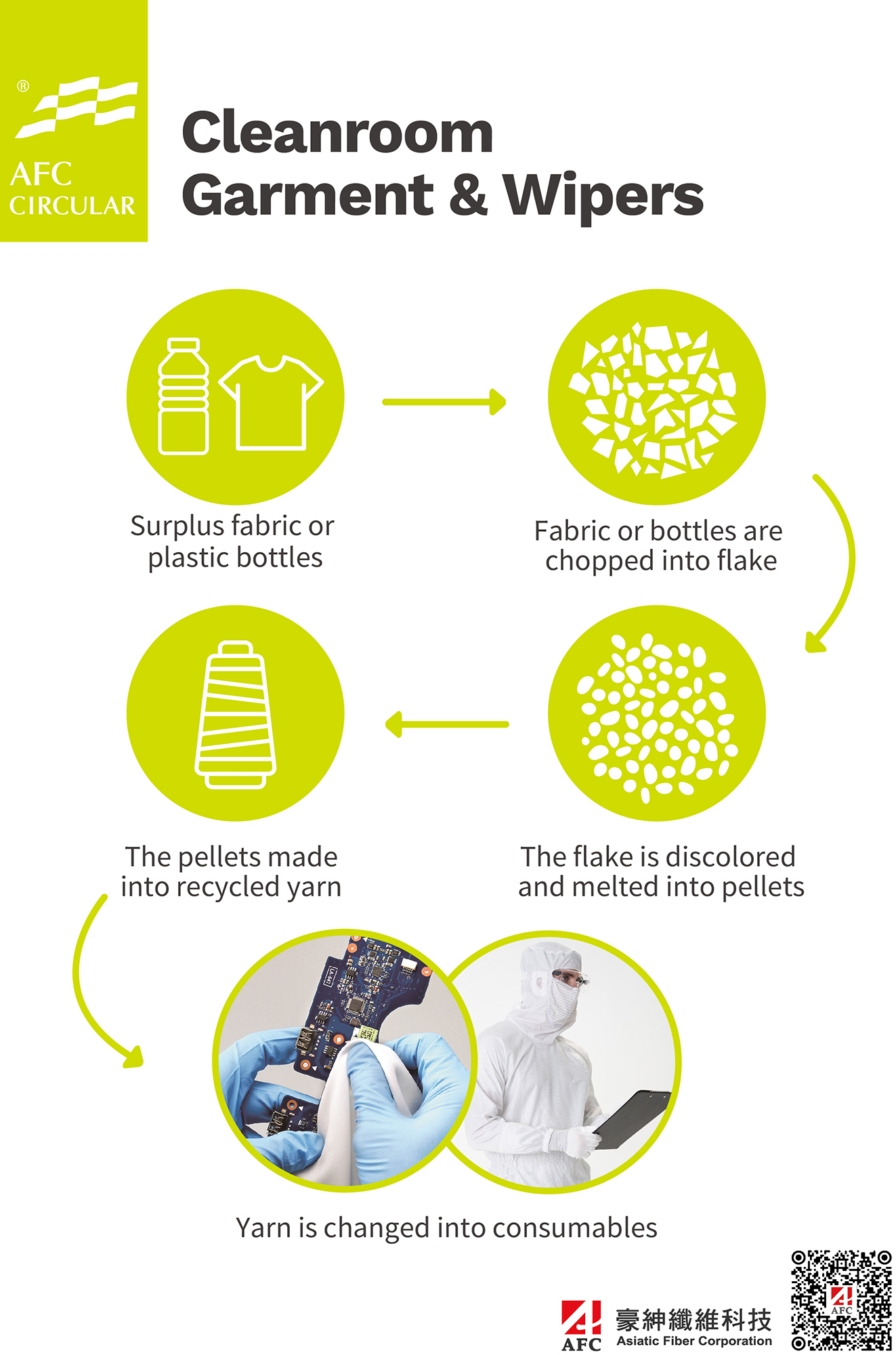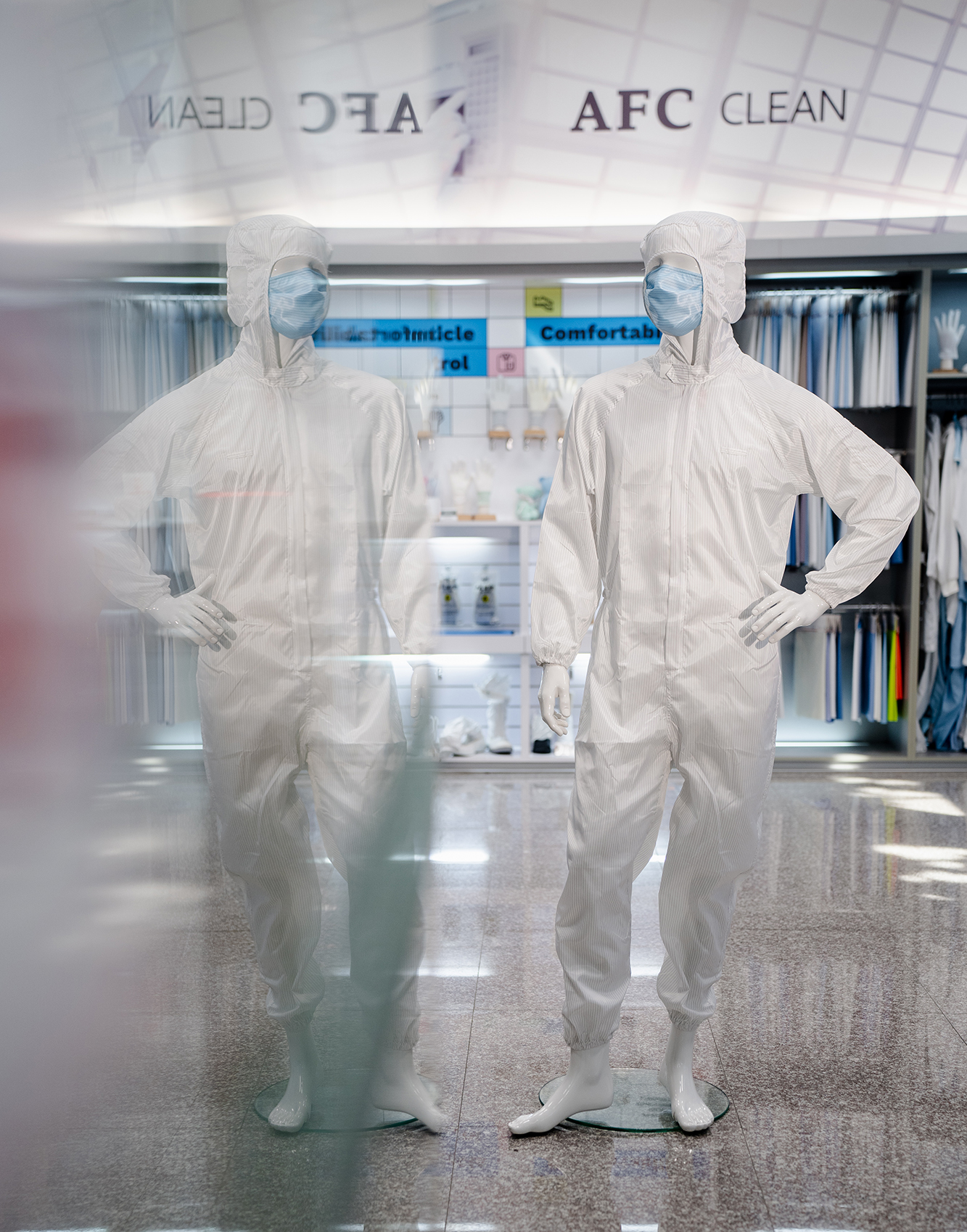
-
Understanding the commercial readiness scale
WTiN’s Commercial Readiness Scale gives an indication of what stage of commercialisation a product is at. It ranges from Emerging: a research stage development; Scaling: the product is being produced on a small but growing scale, and Commercialised: the product is well-established and ready to purchase.


Sponsored by Taiwan Textile Federation (TTF)
Ad. by TITA
Asiatic Fiber Corporation talks to WTiN about making fabrics and apparel that align with combined industry demands for sustainability, wellness and functionality.
Any textiles that enter a controlled production environment such as a cleanroom workspace have to align with stringent microbiological controls because even the smallest particle can cause contamination, lowering production yield or rendering products defective.
And now sustainability requirements have risen up the global corporate agenda, so they have to be considered as well. That’s why the Taiwan-based Asiatic Fiber Corporation (AFC) developed a product that ticks both boxes: absorbent low-lint knitted wipes that adhere to the stringent anti-contamination requirements for the cleanroom workspace and also incorporate recycled materials.
“In introducing the world’s first AFC Circular™ Cleanroom Garment & Cleanroom Wipes, we’ve spearheaded a ground-breaking circular supply chain strategy,” said AFC chairman Chen Ming-tsung. “By repurposing surplus fabric from manufacturing into recycled yarn, we’re not just setting a new standard for innovation; we’re redefining environmental responsibility in textiles.”
The absorbent low-lint wipes are made from 100% polyester, cleanroom laundered and packaged for non-volatile residues and low levels of ions. They also offer chemical resistance for compatibility with various solvents and a thermal resistance below 150°C.
Meeting the sustainability challenge
In addition to the cleanroom wipes, the global drive towards more sustainable manufacturing also inspired the company to develop its AFC Functional Workwear product line, which incorporates recycled materials.
“By enhancing the functionality of fabrics, we aim to elevate the performance and comfort of workwear. This innovative product aligns with the ESG movement and reflects our deep understanding of customer needs,” says Ming-tsung.
“We are a textile service provider that engages in both self-driven and client-led innovation, helping clients become more competitive in their respective markets.”
AFC’s product lines are used in a wide range of industries including solar power, packaging and testing, LED, biotechnology, aerospace and aviation, pharmaceuticals and laboratories, nutraceuticals and food, medical device and microelectronics, amongst others.
To ensure that sustainability doesn’t come at the price of functionality, AFC Functional Workwear is currently undergoing a Body-Box study with a German collaborator DASTEX to ensure the quality of the garments made with recycled materials is on a par with those crafted from new fabrics, in terms of metrics such as particle filtration and release.
The textile industry around the globe is facing increasingly stringent environmental regulations including restrictions on hazardous substances, wastewater, and per- and polyfluoroalkyl substances (PFAS).
As well as repurposing surplus fabric into recycled yarn, AFC has been researching and implementing the practice of upcycling plastic bottles into recycled yarn, creating a circular manufacturing process to participate in the movement to reduce plastic waste.
It has also developed sustainable dyeing processes to minimise water consumption and the use of chemicals and continues to research ways of implementing more recycled content in its products.
“We understand the impact the environmental social and governance (ESG) era is having on businesses. These efforts enable our customers to progress toward their zero carbon emission targets while offering environmentally conscious products,” said AFC chairman Chen Ming-tsung.
AFC believes some manufacturers are responding to more restrictive legislation by turning to countries with less stringent regulation for their supply chains and production.
“This shift creates significant supply chain risks, jeopardising the stable procurement
of raw materials,” says Ming-tsung. “Concentration of suppliers emerges as a primary concern, as heavy reliance on a few sources exposes us to disruptions such as production delays.”
AFC has implemented strategies to address these challenges, such as actively diversifying its supplier base, engaging with multiple sources for critical raw materials to reduce its dependence on any single source and, importantly, employing stringent assessment of potential suppliers.
The company implements robust inventory management practices to ensure sufficient stock of essential raw materials, balancing the need to meet production demands while minimising excess inventory to avoid holding costs.
Sustainability means traceability
Supply chain transparency and traceability have become pivotal focal points for the evolution of the global textiles industry, most notably in the wake of the European Union’s (EU’s) drive towards the adoption of Digital Product Passports (DPPs) by 2027. This legislation requires companies to disclose sustainability information, including details on product traceability along the supply chain.
“Our ISO13485 certification signifies our adeptness in implementing a robust material tracing system, which is crucial for maintaining internal process consistency,” says Ming-tsung. “This globally acknowledged quality management standard for medical device manufacturers mandates traceability measures, encompassing the identification and tracking of product histories, distributions, locations, and applications, along with the management of associated parts and materials.”
The company is also certified through third-party organisations and says, as a DUNS-registered company, its data is transparent and available for all parties to view. It sends its products to international certification companies such as SGS and TUV, which verify the source of the materials and the compliance of its production processes.
AFC recently integrated a smart logistics system that records all product histories to ensure the authenticity and transparency of supply chain data, including detailed data records for each batch of materials from the source to the finished product.
“We have backup plans for each key component in the supply chain, ensuring that we can still supply stably in the event of external impacts,” says Ming-tsung.
Satisfying the wellness trend
Sustainability isn’t the only trend impacting the textile industry. AFC is also catering for the growing emphasis on wellbeing in the workplace.
“As self-care becomes an indispensable part of life, we are shifting our focus towards people’s health, contemplating how to utilise functional intelligent textiles to improve the quality of life and promote preventive medicine,” says Ming-tsung.
For this reason, it founded AFC Wellness: a brand of health-oriented textile products that prioritise personal care by including materials with antibacterial and anti-odour properties. Many of the textiles include graphene, which can provide a temperature-regulating function for workwear.
“We are continuously exploring innovative materials, such as graphene, which we believe can greatly enhance workwear items such as polo-shirts and innerwear by regulating body temperature and providing unparalleled comfort to the wearer,” says Ming-tsung.
Meanwhile, AFC’s smart textile brand iQmax® encompasses smart e-massage textiles with heating modules and textile module with the ability to detect body signals such as ECG.
“By enhancing the functionality of fabrics, we aim to elevate the performance and comfort of workwear. Our innovative products align with the ESG movement and set higher benchmarks for workplace quality and standards, says Ming-tsung.
Have your say. Tweet and follow us @WTiNcomment







